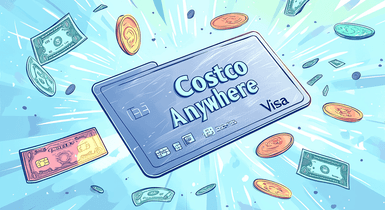How to Choose the Best First Credit Card
Contents

Currently, 82% of adult Americans have at least one credit card. And yet, applying for a card can be an uphill battle. In general, good offers are available only to clients with solid credit ratings and steady sources of income. People without these credentials, like students, often struggle to get approved.
How do you pick out the best starter credit card? What do you need to apply and qualify? And how do you determine if a card is truly worth it? Keep reading to find out the answers to these critical questions!
Overview of Top Beginner Credit Cards
Even though you might not qualify for a premium credit plastic with multiple perks, there are still some deals with enticing welcome offers. Look for solutions that align with your financial objectives when selecting a first-time credit card.
Card | Annual Fee | Benefits | Best for |
|---|---|---|---|
Chase Freedom Rise | $0 | - 1.5% cashback on all purchases; - $25 statement credit after enrolling in recurring payments. | Everyday spenders and those seeking simplicity |
Discover it Student Chrome | $0 | - 2% cashback at gas stations and dining; - 1% cashback on every purchase; - Limitless dollar-for-dollar match of all cashback earned; - 6 months of no initial interest on purchases. | Students |
Capital One QuicksilverOne Cash Rewards Credit Card | $39 | - No foreign transaction fees; - ATM Location Services; - Limitless 1.5% cashback on all purchases; - Zero Liability Policy. | Frequent travelers |
Petal 2 Visa Credit Card | $0 | - Up to 1.5% cashback on daily purchases; - Flexible limits based on your spending habits. | Responsible users looking for credit-building opportunities |
Discover it Secured Credit Card | $0 | - 2% cashback at gas stations and dining; -1% cashback on purchases in other categories; - Unlimited cashback match; - 6 months at 0% Introductory APR. | Credit builders and rebuilders |
Advantages and Disadvantages of Credit Cards

You might be wondering whether getting a credit card is worth it. To help you weigh up the upsides and downsides, check out the list below.
Pros
- A powerful tool for building up your credit history if used responsibly;
- Earning points, cashback, or miles for every dollar spent;
- Travel-related perks and protections,including trip insurance and rental vehicle coverage;
- Certain cards offer safeguards against fraud, damage, and theft during transactions;
- Zero liability protection, meaning you won’t be on the hook for unauthorized purchases;
- Some cards let you shop around with no interest charge during their 0% introductory APR term.
Cons
- Many credit cards for building credit carry additional fees that sometimes can’t be bypassed;
- Interest rates tend to run higher than on other loans;
- It’s easy to rack up debt if spending isn’t kept in check;
- There are eligibility criteria for some cards, such as a credit score and proof of income;
- Your credit score may take a hit if you have made late payments, miss them, or have an outstanding balance.
How to Apply for Your First Credit Card

It is common for people with limited or no credit history to struggle to get approved for competitive credit offers. Fortunately, alternative, beginner-friendly credit cards, can serve as a stepping stone for such clients. There are also student cards. Even if compared to other plastic types, these sometimes provide smaller credit limits and fewer perks, they might be a useful way to start working on your history.
To boost your chances of being approved for the best beginner credit card, take the following steps:
- Narrow your application to options designed for those with little or no credit history. Prioritize options with no or low annual fees and competitive APRs.
- Use a credit monitoring website to assess your score.
- If possible, go through a preapproval check. Many issuers offer prequalification tools that let you check if you're eligible without affecting your credit score.
- Fill out your application completely and accurately, making sure that all the information is correct. Errors or missing details may cause the application to be rejected or delay approval.
If you experience difficulty getting approved for starter cards, consider getting a secured card. When you show that you are making every payment on time, most issuers will repay your deposit, and these cards have a similar potential to establish credit.
Another way is to suggest that a family member makes you an authorized user, particularly if you are underage. But bear in mind it will help only if the payment history is reported to three major credit agencies, so ask the issuer about it.
First Credit Card Requirements

To get approved for a credit card, you’ll need to meet the following eligibility criteria:
Minimum Age
To apply for credit, you must be at least 18 years old. There may be a greater minimum age for getting specific credit cards. Underage applicants usually need to provide proof of an independent source of income.
Credit History
As a rule, you must have a good credit score to qualify for a good offer. If your credit history was previously reported to bureaus, it might help a great deal. However, there are plenty of good starting credit cards with rewards that have less restrictive requirements.
Earnings
To qualify for a credit card, most issuers require applicants or their family members to meet a minimum income threshold. This is necessary to ensure that applicants have enough money to manage and repay any balances incurred on the card. Individuals whose income falls below the minimum eligibility criteria may still be issued a card if they pay a deposit that serves as a guarantee.
Social Security Number
When applying for a card, most issuers require applicants to provide a Social Security number to verify their identity and assess eligibility. However, many issuers offer an alternative for individuals who do not have an SSN: they accept an Individual Taxpayer Identification Number (ITIN). It serves as a substitute, allowing non-citizens, international students, or others without an SSN to access credit-building opportunities and financial tools.
Contact Information
You will need to provide your full name, US address, and date of birth. Commonly, card issuers also ask for a phone number and email address.
Key Things to Look For in a First-Time Credit Card

Choosing the right starter credit card can be overwhelming. Refer to this checklist to guide your decision:
- Minimal Fees. To simplify managing finances, seek out cards with little or no annual fees. The good news is that most starter cards have low or no yearly fees.
- Low Introductory APR. While student and beginner credit cards often come with higher interest rates, some offer a 0% introductory APR period. Your purchases will accrue interest at a reduced rate during this time, after which your interest rate will reset to the standard APR. Since unpaid balances will be subject to interest at the regular APR, review your card terms and statements to find out when the promotion ends.
- Loyalty Rewards. Many credit cards often offer numerous benefits and reward programs that let people gain cashback or bonus points for purchases. Usually, it refers to certain categories and retailers. Some cards allow clients to earn up to 5% cashback on gas, travel purchases, groceries, or streaming services.
- Manageable Credit Limit. Choose a starter credit card with a manageable credit limit. If you are a first-time user, a lower limit can help you keep your spending under control and reduce the risk of overextending.
Final Thoughts
Finding the right credit card is a crucial step toward building a strong financial foundation. Focus on options with low initial annual percentage rates, reasonable limits, and few fees to obtain the best first credit card. Pick cards that will help you build and enhance your credit history by reporting to the major agencies. Whether you opt for a secured or beginner card, prioritize features that encourage responsible financial habits and offer long-term value. With the right option, you can set yourself up for financial success and take advantage of valuable perks as your credit profile grows.




